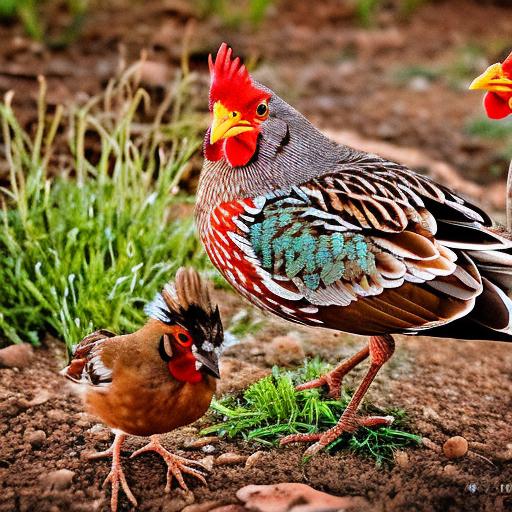Backyard chicken farming has become increasingly popular in Weld County, Colorado, as more and more people are discovering the benefits of raising their own chickens. Not only do backyard chickens provide a sustainable source of fresh eggs, but they also offer a unique opportunity for families to connect with nature and learn about the responsibilities of animal care. In this article, we will explore the various aspects of backyard chicken farming in Weld County, including legal requirements, choosing the right breed, building a safe coop, feeding and caring for chickens, managing waste and composting, health and disease prevention, integrating chickens into your garden, and selling eggs and other products.
Key Takeaways
- Backyard chicken farming is a popular and rewarding hobby in Weld County, CO.
- Legal requirements for keeping chickens include obtaining a permit and following zoning regulations.
- Choosing the right chicken breed depends on factors such as egg production, temperament, and climate adaptability.
- Building a secure chicken coop is essential for protecting chickens from predators and providing a comfortable living space.
- Feeding and caring for chickens involves providing a balanced diet, fresh water, and regular health check-ups.
Legal Requirements
Before starting your own backyard chicken flock in Weld County, it is important to familiarize yourself with the legal requirements and regulations. In most cases, you will need to obtain a permit from the county or city government to keep chickens on your property. These permits typically have specific guidelines regarding the number of chickens allowed, coop size and design, and distance from neighboring properties. It is important to check with your local government to ensure that you are in compliance with all regulations.
In addition to permits, there may also be zoning laws and restrictions that dictate where you can keep chickens on your property. Some neighborhoods or homeowners associations may have specific rules regarding livestock or poultry. It is important to review these regulations before starting your backyard chicken flock to avoid any potential conflicts or legal issues.
Choosing the Right Breed
When it comes to choosing the right breed of chicken for your backyard flock in Weld County, there are several factors to consider. First and foremost, you will want to select a breed that is well-suited to the climate and weather conditions in Colorado. Some breeds are more cold-hardy than others and can withstand the harsh winters in Weld County.
Another important factor to consider is the purpose of your flock. If you are primarily interested in egg production, you will want to choose a breed that is known for its high egg-laying capabilities. Some popular egg-laying breeds include the Rhode Island Red, Leghorn, and Australorp. On the other hand, if you are interested in raising chickens for meat, you will want to choose a breed that grows quickly and has good meat quality, such as the Cornish Cross or the Freedom Ranger.
Building a Safe and Secure Coop
Building a safe and secure coop is essential for the health and well-being of your backyard chickens. The coop should provide protection from predators, such as raccoons, foxes, and coyotes, as well as shelter from the elements. When designing your coop, it is important to use sturdy materials that can withstand the weather conditions in Weld County. Wood is a popular choice for coop construction, but it should be treated or painted to protect against rot and decay.
In addition to using sturdy materials, it is important to consider the design of your coop. The coop should have proper ventilation to prevent moisture buildup and ensure good air circulation. It should also have enough space for your chickens to move around comfortably and access to nesting boxes for egg-laying. It is also important to include a secure door or gate that can be locked at night to prevent predators from entering the coop.
Feeding and Caring for Your Chickens
Proper nutrition is essential for the health and productivity of your backyard chickens. A balanced diet should include a combination of commercial chicken feed, fresh fruits and vegetables, and access to insects and worms. Commercial chicken feed can be purchased at most feed stores and comes in different formulations depending on the age and purpose of your chickens.
In addition to providing a balanced diet, it is important to establish a feeding schedule for your chickens. Chickens should have access to food throughout the day, but it is best to feed them in the morning and evening to prevent overeating and waste. It is also important to provide fresh, clean water at all times.
In terms of general care, chickens require regular attention and maintenance. This includes cleaning the coop on a regular basis to prevent the buildup of waste and bacteria. Chickens should also be checked for signs of illness or injury and treated accordingly. Regular grooming, such as trimming nails and beaks, may also be necessary.
Managing Chicken Waste and Composting

One of the benefits of backyard chicken farming is the opportunity to utilize chicken waste for composting. Chicken manure is a valuable source of nutrients for plants and can be used to improve soil fertility in your garden. However, it is important to manage chicken waste properly to prevent contamination and odor issues.
To safely and effectively compost chicken manure, it is important to create a separate compost pile or bin specifically for chicken waste. This compost pile should be located away from your garden and any water sources to prevent contamination. It is also important to regularly turn the compost pile to promote decomposition and prevent odor.
Health and Disease Prevention
Like any other animal, backyard chickens are susceptible to various health issues and diseases. It is important to be proactive in preventing these issues through proper care and management. Common health issues for backyard chickens in Weld County include respiratory infections, parasites, and nutritional deficiencies.
To prevent respiratory infections, it is important to provide good ventilation in the coop and avoid overcrowding. Regular cleaning of the coop and nesting boxes can also help prevent the buildup of bacteria and mold. Parasites, such as mites and lice, can be prevented through regular cleaning and dusting with diatomaceous earth.
Integrating Chickens into Your Garden
Allowing chickens to roam in your garden can provide several benefits, including pest control and soil fertility. Chickens are natural foragers and will eat insects, slugs, and other pests that can damage your plants. They will also scratch and dig in the soil, which can help aerate and fertilize the garden.
However, it is important to protect your plants from being damaged by chickens. This can be done by creating barriers or fencing around sensitive areas of the garden. You can also designate specific areas for the chickens to roam and provide them with plenty of food and water to discourage them from eating your plants.
Selling Eggs and Other Products
If you have a surplus of eggs or other chicken products, you may be interested in selling them. However, it is important to be aware of the regulations and requirements for selling eggs and other chicken products in Weld County. In most cases, you will need to obtain a license or permit from the county health department and follow specific guidelines for food safety and labeling.
In addition to obtaining the necessary permits, it is also important to market and sell your products effectively. This can be done through local farmers markets, online platforms, or direct sales to friends and neighbors. It is important to establish a reputation for quality and reliability to attract customers and build a successful business.
Backyard chicken farming in Weld County, Colorado offers numerous benefits, including a sustainable source of fresh eggs, a connection with nature, and an opportunity to learn about animal care. By following the legal requirements, choosing the right breed, building a safe coop, providing proper nutrition and care, managing waste and composting, preventing diseases, integrating chickens into your garden, and selling eggs and other products responsibly, you can enjoy the rewards of backyard chicken farming while contributing to a more sustainable lifestyle. So why not start your own backyard chicken flock today?
If you’re wondering whether you can keep backyard chickens in Weld County, CO, you’ll be happy to know that it is indeed possible. However, before diving into this rewarding endeavor, it’s important to educate yourself on the necessary steps and considerations. One helpful resource is an article on Poultry Wizard titled “Chicken Coop Muskegon: A Guide to Building the Perfect Coop.” This article provides valuable insights into constructing a suitable coop for your chickens, ensuring their safety and comfort. To learn more about the number of chickens you may need for a family of four, check out another informative article on Poultry Wizard titled “How Many Chickens Do You Need for a Family of 4?” And if you’re interested in expanding your poultry knowledge beyond chickens, Poultry Wizard also offers an article titled “What Vegetables Do Quails Eat?” which explores the dietary preferences of quails and how to incorporate vegetables into their diet.
FAQs
What is Weld County, CO?
Weld County is a county located in the state of Colorado, United States. It is the third most populous county in Colorado and is known for its agricultural industry.
Can you keep backyard chickens in Weld County, CO?
Yes, you can keep backyard chickens in Weld County, CO. However, there are certain regulations and guidelines that must be followed.
What are the regulations for keeping backyard chickens in Weld County, CO?
The regulations for keeping backyard chickens in Weld County, CO include obtaining a permit, limiting the number of chickens to six per household, providing adequate shelter and space for the chickens, and keeping the chickens contained within a fenced area.
Do I need a permit to keep backyard chickens in Weld County, CO?
Yes, you need a permit to keep backyard chickens in Weld County, CO. The permit can be obtained from the Weld County Department of Public Health and Environment.
What are the benefits of keeping backyard chickens in Weld County, CO?
The benefits of keeping backyard chickens in Weld County, CO include a source of fresh eggs, natural pest control, and fertilizer for gardens.
What are the potential drawbacks of keeping backyard chickens in Weld County, CO?
The potential drawbacks of keeping backyard chickens in Weld County, CO include noise, odor, and the possibility of attracting predators such as raccoons and coyotes.
Meet Walter, the feathered-friend fanatic of Florida! Nestled in the sunshine state, Walter struts through life with his feathered companions, clucking his way to happiness. With a coop that’s fancier than a five-star hotel, he’s the Don Juan of the chicken world. When he’s not teaching his hens to do the cha-cha, you’ll find him in a heated debate with his prized rooster, Sir Clucks-a-Lot. Walter’s poultry passion is no yolk; he’s the sunny-side-up guy you never knew you needed in your flock of friends!







